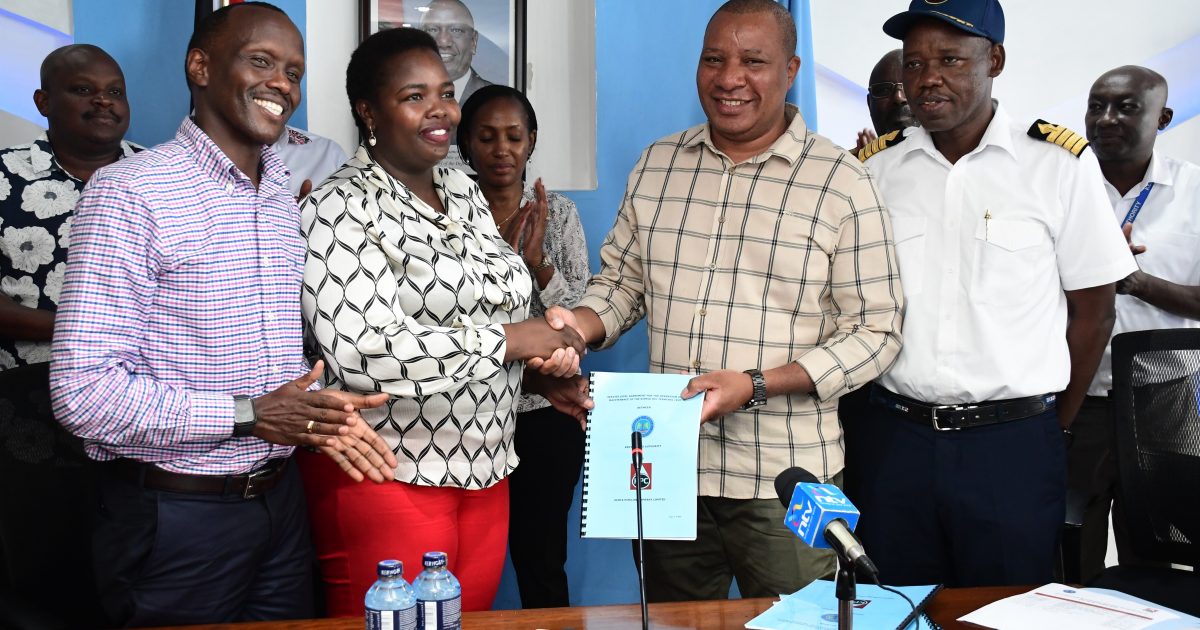The Kenya Pipeline Company (KPC) and Kenya Ports Authority have today signed a Service Level Agreement (SLA) for the operations and maintenance of the Sh40 billion new Kipevu Oil Terminal 2 (KOT 2).
The move aligns with a presidential directive for synergizing the two-state corporations.
KPC Chairperson Faith Boinett termed the signing a milestone that will open the country to regional businesses and employment opportunities. His KPA counterpart, Benjamin Tayari said the agreement will remove bottlenecks that resulted in ineffectiveness.
The SLA, KPC Managing Director (MD) Joe Sang stated it stipulates the role of the two-state corporations. KPC’s role is to provide security of supply of petroleum products across the region.
“We are able to bring in through the pipeline 8.1 billion litres of petroleum products every year. It has been increasing, three years ago it was 7.5 billion litres. This year we are targeting close to 9 billion litres,” said MD Sang after signing the SLA at KPA Headquarters in Mombasa.
MD Sang noted that 60 percent of the petroleum products are consumed locally while the remaining 40 percent is for transit markets in Uganda, Rwanda, Burundi, the Democratic Republic of Congo (DRC), some parts of Somalia, South Sudan and a bit in Tanzania.
The agreement the KPC MD said cements the Port of Mombasa as a gateway to East Africa as Uganda has already committed since June to import all their petroleum products through Kenya and will use KPA and KPC facilities.
“I want to assure the Ugandans that we are ready to serve the market and we want all the volumes of petroleum products to be transported through the pipeline because it is safe, efficient, and cheap,” stated Sang.
To bolster storage capacity, KPC plans to commission a storage facility to handle 100 million litres of petroleum products in Port Reitz, Changamwe.
“We are improving our connectivity in terms of flow of the products. KPA can discharge up to 8 million litres per hour. We are also improving our capacity so that we can serve the country better and ensure Kenyans go about their work without the headache of having to imagine that there is a stockout,” said MD Sang.
On his part, KPA MD Capt. William Ruto noted that SLA gives the two state corporations with shared responsibilities and obligations that will improve tankers’ turnaround times.
To enhance efficiency, KPA will allocate a space for KPC to set up a laboratory at KOT 2 instead of transferring samples to their laboratory.
Through the collaboration, Capt. Ruto stated that they are keen to enhance efficiency in the evacuation of petroleum products.
“By giving them a small space to carry out laboratory tests here we will be able to reduce time before a ship starts operations. It is also important to give ourselves specific timelines to reduce the cost of doing business because time is money. If you delay a ship for an hour it’s so costly,” said Capt. Ruto.
The KOT facility he added is one of its kind in the region and the government and KPA invested heavily in coming up with a facility that is not only for the present but for the future too.
“This facility is built to operate for about 100 years, in fact, this facility is dredged to minus 15 metres, but there is provision for re-dredging again to minus 18 metres,” explained Capt. Ruto, adding the design allows for re-dredging when demand increases without affecting the infrastructure itself.
The KOT 2 facility has four berths with a total length of 770m and one work boat wharf at Westmont area for landing facilities.
It also has five sub-sea pipelines buried 26 metres under the seabed to allow for future dredging of the channel without interfering with the pipes.
There are risers dedicated to separate oil products and six onshore pipelines each dedicated to a separate oil product connecting the terminal to Kenya Petroleum Refineries Limited and the Kenya Pipeline Company storage tanks.
It is also fitted with a liquid petroleum gas facility, crude oil and heavy fuel oil and has provisions for handling white petroleum products.
By Sadik Hassan





